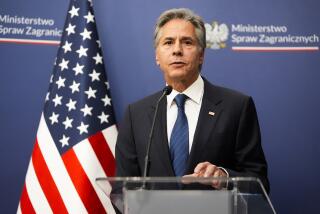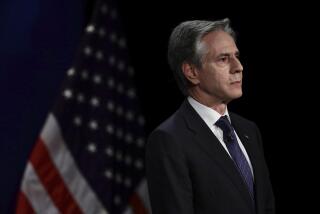Sanctions on Libya send strong message, officials say
International sanctions imposed on Moammar Kadafi and his regime will have little direct effect on his ability to raise money or rally his army against a rising insurgency, U.S. officials acknowledged Tuesday.
But U.S. and allied leaders are counting on the measures having an important indirect effect by convincing those around Kadafi, if not the leader himself, that they face a bleak future in a world determined to see his four decades in power come to an end.
The sanctions, imposed by the United States, European allies and the United Nations, freeze Kadafi’s assets, forbid travel and arms sales, and set in motion investigations that could lead to war crimes charges.
In recent days, U.S. and allied officials have been sending messages to Kadafi, his top lieutenants and the businesspeople who support them, that they face isolation, officials said.
“The message is that if he continues fighting, it’s at his own expense,” said a senior administration official, who spoke on condition of anonymity because of the diplomatic sensitivity. “And maybe some fissures will open up within his inner circle, if some of them start to realize that their interest won’t be well served by clinging to a leader whose time has come.”
The Obama administration has begun moving military equipment toward Libya and said all options are being considered. But top administration officials indicated that they are likely to move with restraint.
There has been a stream of reports of both civilian and military officials peeling off from the regime and joining the opposition.
Matthew Levitt, a senior Treasury Department official in the George W. Bush administration, said it is likely that Kadafi has money beyond the $30 billion in U.S.-based financial institutions that was frozen by the Treasury Department on Monday. Kadafi and his family also may have access to money that is in other names not listed by the Treasury Department order, he said.
Nevertheless, the freeze “will send a strong message to the people in the regime, and make them wonder about how long it is in their interest to remain with it,” said Levitt, who is now with the Washington Institute for Near East Policy. “It tells them the world is focused on Libya.”
In addition to their U.S. assets, Kadafi, his family and the Libyan government have even more in Europe, the Persian Gulf and Southeast Asia, analysts said. Libya owns 60% of Bahrain’s second-biggest bank.
And though opposition forces say they now control much of Libya’s petroleum infrastructure, Kadafi’s government is still pumping oil, even though some countries, such as Italy, are now refusing to purchase it.
This means he will be able to continue to pay the African mercenaries he has brought in to help him fend off anti-government militias.
“He has access to cash — for now,” the senior administration said. Yet the asset freeze may make the mercenaries wonder if they can count on continued pay, he said.
U.S. officials have been trying to bring pressure to bear on Kadafi by enlisting governments and businesspeople who have influence with him. The U.S. is seeking help from Arab states and from Italy, which has close ties and strong links to Libya.
American and European officials also have been warning that they may consider some military steps, such as imposing a no-fly zone to prevent Kadafi from using his aircraft to strike civilians.
But though a no-fly zone is under active consideration, U.S. officials have made clear their reluctance to use that strategy.
Staff writer David S. Cloud contributed to this report.
More to Read
Get the L.A. Times Politics newsletter
Deeply reported insights into legislation, politics and policy from Sacramento, Washington and beyond. In your inbox three times per week.
You may occasionally receive promotional content from the Los Angeles Times.











